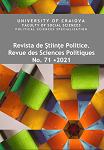Millennials, a Swing Vote in the Romanian Presidential Elections
Millennials, a Swing Vote in the Romanian Presidential Elections
Author(s): Claudia Elena IonașSubject(s): Electoral systems, Politics and society, Present Times (2010 - today)
Published by: Editura Universitaria Craiova
Keywords: political participation; generation; Millennials; vote; elections;
Summary/Abstract: The Millennial Generation in Romania was born in the last years of the Communist regime but first cast their ballot under democratic rule. In 1990, after the fall of the totalitarian regime, Millennials were aged 6 to 9. They first went to the polls in the 2000 general and presidential elections. In the 2014 presidential elections, as the entire generation had reached the voting age, Millennials played a significant role. The second most numerous generation in Romania, they have since had a greater influence on the outcome of elections. Regarding birth years, my study refers to the Pew Research Center classification (Pew Research Center, 2018), which places them between 1981 and 1996. As a result, Millennials were aged 18 to 33 in 2014, and 23 to 38 in 2019. The results of the first round of the 2019 presidential elections point to vote splitting within the Millennial Generation: 39% voted for incumbent Romanian President Klaus Iohannis and 31% for Dan Barna, the leader of the Save Romania Union (USR). Other Millennials voted for former leader of the Social Democratic Party Viorica Dăncilă (10%), Theodor Paleologu (7%) and Mircea Diaconu (5%). In the second round, Klaus Iohannis defeated Dăncilă. Millennials voted massively for Klaus Iohannis: 84,16%.
Journal: Revista de Științe Politice. Revue des Sciences Politiques
- Issue Year: 2021
- Issue No: 71
- Page Range: 41-54
- Page Count: 14
- Language: English

